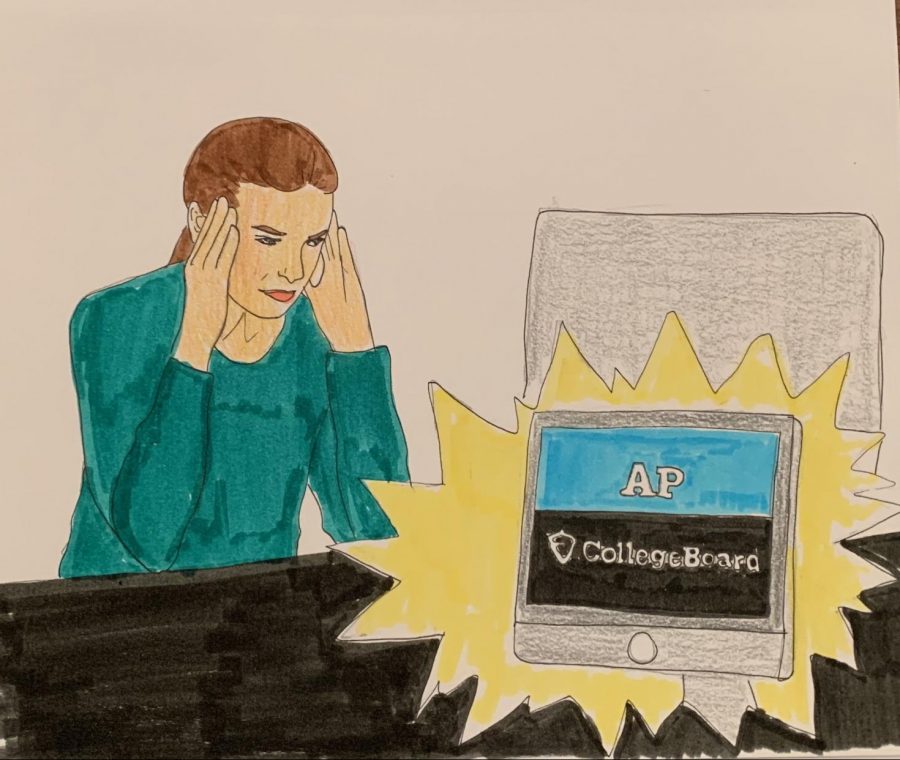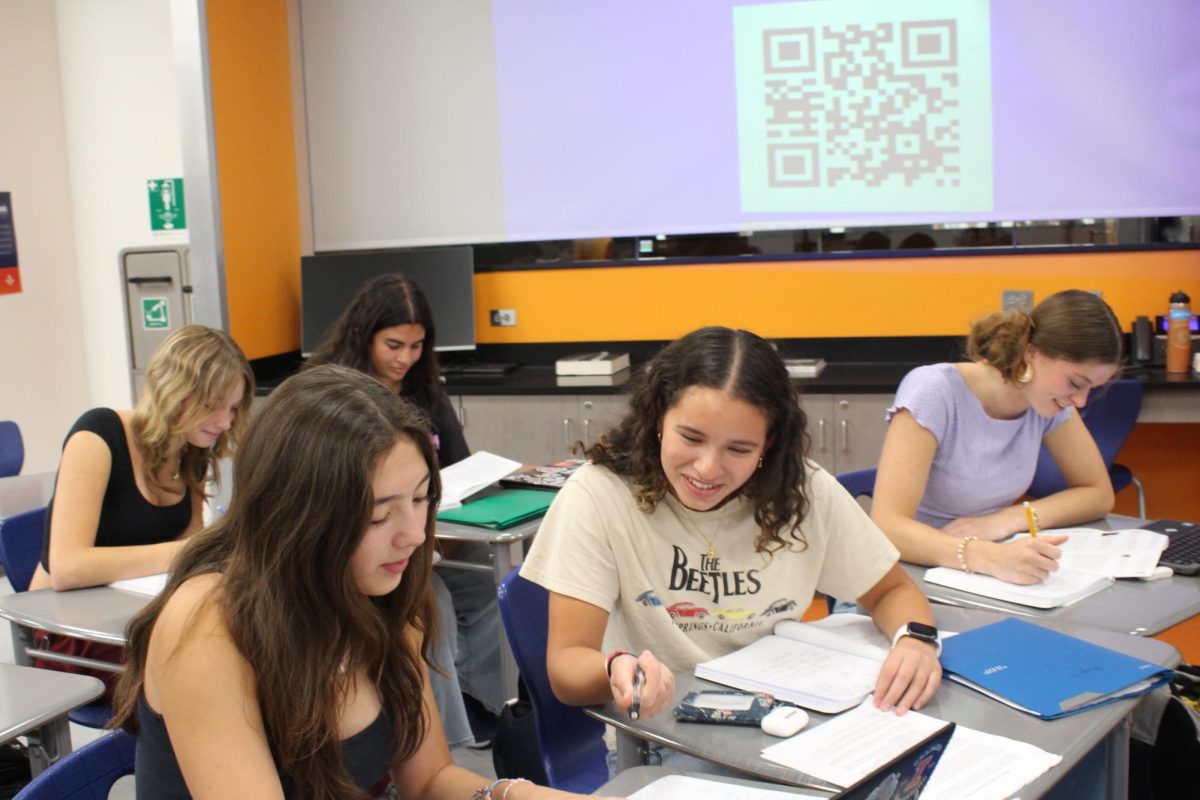ETHS students, teachers adapt to AP and standardized testing changes
May 18, 2020
Although spring in the academic calendar is typically the season of standardized testing, in the midst of the ongoing COVID-19 pandemic, the AP and SAT tests are not among the personal priorities of some students like us.
While ETHS is closed for the remainder of the school year, AP tests are going on, currently taking place from May 11 to May 22. However, these tests look much different from that of the typically three-hour long test students would be taking in normal times. Instead, these tests are digital, 45-minutes long and exclusively free response questions, according to the official page on the College Board website. Given the nontraditional nature of these exams, the College Board has acknowledged that there is no current way to prevent students from using outside resources. For this reason, this year’s exams have been deemed “open note.” Given how different this is from what AP students have prepared for all year, some students and teachers were surprised by the changes.
“I think the thing that surprised me most hearing about the online format was the fact that it was going to be, like, an ‘open-note’, ‘open-Internet’ format,” says AP Chemistry teacher Tina Lulla.
While this format may seem to generally work in students’ favor, additional complications have come with preparing for the exams. Since e-learning began at ETHS, AP teachers have facilitated different policies towards balancing the coverage of the rest of the curriculum with test preparation. Most teachers have had the ability to coordinate review materials as they choose for AP exams, and are largely taking up this opportunity to prepare students in a unique way.
“On the one hand, [AP test preparation] has been harder because face-to-face time is so much different than any other form of instruction and there’s nothing we can really do to replace that. On the other hand, the reduced content on the exam has allowed me to do a kind of focused review I ordinarily wouldn’t get to,” says AP English Language teacher Joshua Brown.
To add to the flexibility teachers have with review, the College Board has clarified that “the exam will only include topics and skills most AP teachers and students have already covered in class by early March,” in order to level the playing field based on the different times schools around the country began closing, as well as the different schedules AP teachers may have had in covering content. However, the freedom teachers have also means some have opted to also introduce new material that likely won’t be on the test, which some students fear detracts from their exam review.
“We’re still stuck on learning new material and new concepts instead of focusing on the changes of the AP test, working towards preparation for the tests, and dialing in our focus on the tests,” says junior Andy Vye, who is taking four AP classes this year.
Some students dislike the changes and feel that the new testing format, as well as preparation through e-learning, inherently hurts students who are more of “social learners,” or people who do better studying in groups. These types of learners benefit from a hands-on learning style that isn’t attainable with schools being shut down for the remainder of the year. For some, the present circumstances cause them to feel a sense of stress between balancing social distancing practices and studying.
“I think that the school generally has left [AP test preparation] up to teachers to prepare us and it comes down to how much preparation a particular teacher is willing to do during this e-learning period,” says junior Jonathan Zenkich, who is also enrolled in four AP classes.
Despite the challenges associated with a new testing format, some students do believe that ETHS has been adequately preparing for this radical shift.
“They have given us all the necessary resources to prepare, and information such as emails and the E-Town Live livestreams,” says junior George Pareti, who is taking three AP classes.
Both ETHS students and AP teachers have also found support in their preparation through the videos the College Board has made available for every AP class.
“The AP and College Board have provided plenty of resources given that this year’s exam is online. They do a live YouTube review session,” says AP Statistics teacher Jacob Mills. And with the nature of reviewing for tests exclusively online, teachers have had an easier time making preparation a collaborative effort. “I’m a member of a couple of Facebook groups with AP stats teachers around the country, so we’ve shared tons of resources together.”
Review videos for each class have been live streamed on the AP YouTube channel, where they are also available to be rewatched. In what could perhaps be considered an effort from the College Board to make these videos seem a little more interesting to the average student, a number of prominent guests have been featured to give lectures, including Hamilton composer Lin-Manuel Miranda for AP U.S. History, former senior presidential advisor under Obama, Valerie Jarrett, for AP U.S. Government and Politics, and FiveThirtyEight founder Nate Silver for AP Statistics.
“The College Board this year has put out more material than I’ve ever seen, and it’s definitely good material, especially the YouTube videos that they’ve been making have been really high quality,” Lulla adds.
Another question at hand is how colleges will view results from the tests this year in the format they’re in, particularly for juniors who are just starting the college admissions process. Although ETHS has provided links to resources, such as guidelines from Harvard University about how the COVID-19 fallout should not negatively affect current juniors as they apply, there is still uncertainty about the extent to which AP scores from this year’s tests will be able to translate to college credit.
“I guess [colleges] will have to be more lenient because the credits still are going to be given out, but I feel like there’s going to be a sense of, ‘These AP tests aren’t as valid as the previous ones and don’t demonstrate as much as the 3 hour ones’, and I don’t know if that will have any legitimate impact on people in college but it will definitely be a sentiment in college admissions for next year,” Zenkich adds.
For as much as schools may currently be providing reassurance, there are still concerns about how colleges will handle standardized testing for current juniors, given how heavily SAT/ACT scores are traditionally weighted in the admissions process. According to the College Board, large, public state universities are the most likely colleges to weigh standardized test scores, along with GPA, as the most important factor in their decisions.
“Because taking ACT and SAT prep is such a huge endeavor as is, and taking these AP classes, when things get thrown out of whack, it’s a lot harder to hop back on the train,” Vye adds. “I think colleges aren’t going to put as big of an intent on standardized tests and the AP tests and they’ll put more emphasis on rec letters and grades up until that point.”
As the College Board also administers the SAT, they have cancelled all initially scheduled spring 2020 PSAT and SAT dates, including the April 13 PSAT 10 and SAT tests that ETHS sophomores and juniors, respectively, were scheduled to take. The current plan for making up tests for students that missed these dates is to have an SAT date every month through the end of 2020, provided by this time the state of the COVID-19 situation would allow for in person testing.
For the time being, this means a new test on Sept. 26, as well as previously scheduled dates on Aug. 29, Oct. 3, Nov. 7, and Dec. 5 (all of which are Sundays). Registration for these test dates is expected to begin the week of May 26. In the event of schools remaining closed in the fall, the College Board is developing a digital SAT, to be in a similar format of the AP exams, that would be administered in place of these make up dates.
As far as the ACT is concerned, their April 4 test date was cancelled, and they currently have a makeup date scheduled for June 13 and a previously scheduled date on July 18. It is as of now unclear what the ACT plans to do if these dates also cannot be held. For as much uncertainty as some of the other standardized tests may bring for ETHS students, we think it’s at least heartening to see somewhat of a return to normalcy in the form of the ongoing AP tests, even if the format is unrecognizable compared to past years.
“I think the whole submission process went better than I was expecting but [the test] was pretty difficult. On the logistics side of everything I think it went pretty smoothly,” Zenkich comments on his experience with the AP Government test.
Similarly, sophomore Iman Williams was content with her experience on the AP Government test, her lone AP exam this year. “Other than adding a few more minutes to the clock, I honestly felt fine about the exams. We were able to use our notes and my teacher posted a lot of practice questions on Google Classroom for us to study and work on, so the exam didn’t seem completely foreign to me.”
While the reaction to the content on the exams can more easily vary depending on an individual student’s preparation, students have largely agreed that they weren’t quite given enough time on exams.
“Having a time limit like that does not promote good ideas about thinking. If you have a timed essay, and it’s like, ‘you have to give me everything you know about this in 45 minutes’, it can get dicey,” Vye adds on his test experience.
Regardless of what the general opinions for the AP exams this year were like, it’s possible this isn’t the last time high stakes exams will have to be held digitally. Schools across the country seem likely to be coming back at different times due to varying infection rates and procedures for re-opening. With the schedules of different districts being so off balance, it’s hard to see us going back to a normal any time soon, leading some in anticipation for another year of online class instruction, let alone online testing. Governor J.B. Pritzker has stated that Illinois schools should be prepared both for remote classes and regular classes next fall.
If we do return to school in the fall, both the normal exam format and the this year’s digital format could plausibly be on the table for future AP testing in a post COVID-19 world, as the situation this year does provide the College Board the benefit of seeing the pros and cons of administering AP exams digitally, something that perhaps could’ve been on the horizon anyway.
“I think that standardized testing has been trending [digitally] in recent years anyway, not the SAT and ACT but the LSAT recently moved to being digital,” Zenkich adds.
While time may prove that one format is better than another, having flexibility isn’t a bad thing, especially if you’re a business like the College Board.
“I wonder if they might do some kind of mix where the exam is still offered on paper at schools for most students but they have an online option for some students, but my guess is that all of that is really going to based on business decisions,” Lulla adds.
But regardless of where the future of standardized testing, and even education takes us, there are some aspects of education in general that a computer screen will never be able to replace.
“Through all this, I think that some high school students, teachers, and parents around the country are realizing the value in person education and having a quality teacher in front of them physically every single day. I’m hoping that through all this craziness and these horrific times, that we can come out of this and have more value on public education and more value on teachers as well. I think that’s been magnified by this, and hopefully that’s one benefit we’ll see,” Mills says.












